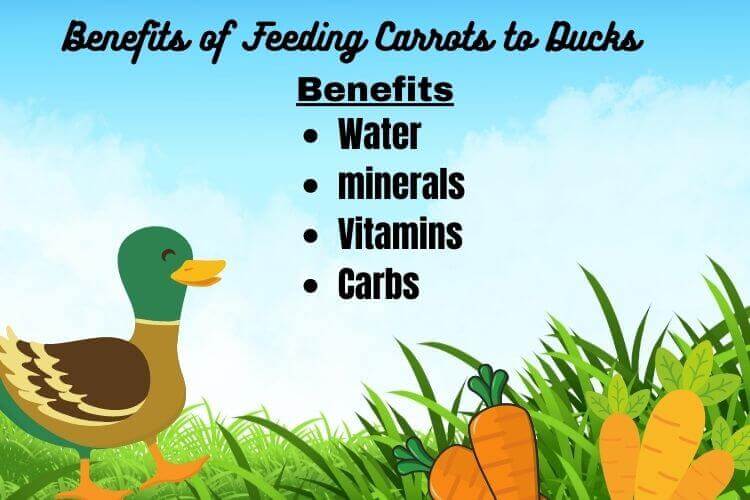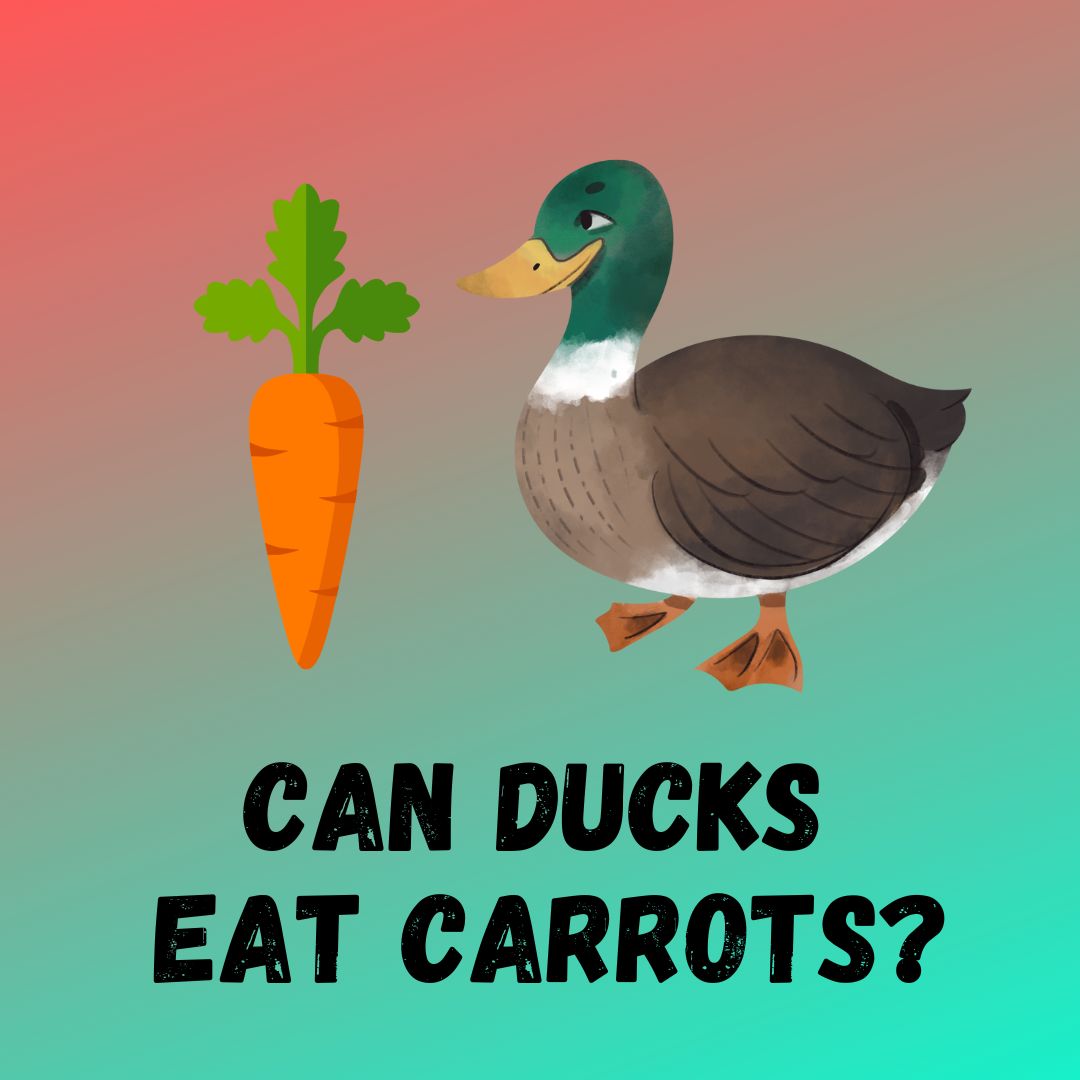Ducks can eat and do enjoy a wide variety of veggies. In addition to adding color to duck food (which is useful in some cases), vegetables are full of nutrients. Nonetheless, some vegetables are good for ducks, and others that ducks should not be fed. Knowing which category a vegetable falls into is crucial to the health of your ducks.
Post Contents
Can Ducks Eat Carrots?
Ducks can eat both carrot roots and tops. However, ducks can choke on whole uncooked carrots. Therefore make sure carrots are cooked, grated, or chopped. You can also feed carrot peels to ducks.
Carrots like all other vegetables are a good source of vitamin A and its precursor Beta carotene is highly beneficial to the ducks.
Benefits of feeding carrots to your ducks
Here’s why you should feed carrots to your ducks;
Carbs
According to Registered Dietician Nutritionist Adda Bjarnadottir, 100 grams of carrots contains about 41 calories.
In fact, carrots are mainly comprised of carbs and water in large quantities. The carbs in carrots are good sources of energy for ducks.
Water
Bjarnadottir tells us that carrots are typically comprised of 88% water. Although there’s no replacement for regular clean drinking water when it comes to proper hydration – and ducks need an abundant supply of that – water-rich foods are good for ducks because they are easily digestible and boost the hydration of the duck.
Beta-carotene
This applies if you have an egg-laying duck and you’re interested in the eggs that are laid by the duck. Beta-carotene is a nutrient found in carrots that will enable your ducks’ eggs to have brilliant orange egg yolk.
Low maintenance food
When you cook using vegetables, you’d probably throw away kitchen peelings. But you don’t have to do that with carrot peelings and carrot tops because they are delicious, natural, and vitamin-rich food for ducks.
Important minerals and vitamins to help your egg-laying ducks

Yes, if you’re keen on the eggs laid by egg-laying ducks, carrots have some vitamins and minerals that will help.
These include Vitamin A, Biotin, Vitamin B6, and potassium;
- Vitamin A enhances the ducks’ growth rate, improves egg production, hatchability, and antibody production (so that they can fight diseases better).
- Biotin also enhances hatchability and egg production. In addition, biotin reduces footpad burn sore or food pad dermatitis which happens when ducks trot about on hard surfaces for long periods of time.
- Vitamin B6 prevents improper growth of organs, decreased egg production, low egg weight, and weakened feather growth in young ducklings.
Carrot tops versus the carrot tube?
Ducks can eat carrot tops and they are, in fact, recommended because of their nutritious content.
Carrot tops contain significant amounts of Vitamin A, Vitamin C, dietary fiber, and calcium.
Above, we’ve talked about the benefits of Vitamin A. One thing I’ll add is that vitamin A deficiency can be spotted in ducks from signs of weeping eyes with a “wet” sticky discharge – the part of the eye known as the cornea may also become opaque and appear whitish.
If you notice these symptoms, duck rearing expert Nyiri Murtagh recommends that you get vitamin A supplements, coupled with vitamin D3, maize, cod-liver oil, and fresh greens (of course with our carrot greens being an example).
These other nutrients in carrots tops have their own importance for ducks. For instance:
- Vitamin C will help your ducks to grow into proper body weight. If you’re rearing ducks for the eggs they produce, Vitamin C will lead to better egg production.
- Dietary fiber helps in the gizzard development of your ducks as well as better performance, especially when it comes to their health and growth.
- Calcium is key for egg-laying ducks because calcium forms a significant portion of the eggshell. But even if you’re not interested in the egg-laying ducks for their eggs (that’s to say that you’re rearing them as pets), you still need to be concerned about calcium deficiency.
For instance, without sufficient amounts of calcium, the duck eggs could be stuck inside a duck (a condition commonly referred to as “egg-bound”) and this is potentially fatal.
Elsewhere, along with phosphorus, calcium will help in proper bone formation and the general health of your ducks.
The difference between the carrot greens and the carrot tube is that the greens contain vitamin K whereas the carrot tube does not contain this vital vitamin.
Vitamin K is a fat-soluble mineral that helps ducks to synthesize certain proteins that are required for the proper clotting of blood.
Therefore, it’s important to feed your ducks the carrot tube as well as the carrot greens.
Are organic carrots better for ducks?
Most stores will offer organic and conventionally grown carrots. So, which is best for ducks?
Experts tell us that there’s no difference nutrition-wise. The difference comes about where conventionally grown carrots could have higher amounts of residue pesticides as compared to organic carrots. So, it’s better to avoid conventionally grown carrots whenever you can.
Things to keep in mind as you feed carrots to your ducks
- Carrots have dyes that will change the color and consistency of a duck’s poop. This is nothing to worry about really. Other color-rich foods that can present the same effects include beets, tomatoes, cherries, and greens.
- Avoid feeding your ducks canned carrots. These carrots usually have high salt concentration and this salt can be harmful to your ducks.
- Ducks will avoid eating raw un-chopped raw carrots – even though they are baby carrots. Therefore, it is recommended that raw carrots be chopped into bite-sized chunks or grated; this will make the carrots easier to consume.
How often should you feed carrots to ducks?
When ducks love a certain kind of food, they can eat it to their fill. This is not always good because they lose out on other sources of nutrition in a balanced diet
Also, water-rich foods can cause ducks to release waste that is waterier than it normally is. Therefore, feeding too much carrot is not recommended.
So, how often should ducks eat carrots? Well, carrots should be fed as treats.
That means that a large quantity of a duck’s diet should be comprised of quality duck feed. Experts recommend limiting treats to 10% of a duck’s daily diet.
If carrots will only occupy 10% of the duck’s diet, then they have to be served from time to time and not every day.
After all, there are several treats to switch between, and treats should be special. Therefore, keep carrots special by feeding them in small amounts from time to time.
What should you not feed ducks?
Citrus fruits, spinach, iceberg lettuce, raw dried beans, White Potatoes, Green Tomatoes, and Purple Eggplant.
Related Questions
can muscovy ducks eat carrots?
Muscovy ducks can eat also eat both the carrot roots and tops moderately as part of a balanced diet mixed with other vegetables such as cabbages, sweet potatoes, broccoli, cucumber, kale spinach, and much more.
Do ducks eat cooked carrots?
Yes, ducks eat cooked carrots. Cooked carrot is good because the ducks can eat them whole – no matter the size or shape. But you can also chop it into small pieces if your ducks are not eating them whole.
Do ducks eat frozen carrots?
Yes, ducks can eat frozen carrots. This means that you can store carrots in the fridge/freezer to serve your ducks at a later date. What you need to ensure is that you defrost the carrots first before feeding them to the ducks.
Can ducks eat carrot tops? Ducks can also eat carrot tops, feeding carrot tops to your ducks will provide them with Vitamin A, Vitamin C, dietary fiber, and calcium. Chop the carrot tops into smaller pieces and mix them with other veggies such as tomatoes or strawberries and give them to your ducks.
Final Thoughts
Carrots are unique root veggies. This is because they can be fed to ducks in their entirety. We discussed tomatoes recently, and we saw that ducks will only eat ripe tomatoes but not green/unripe tomatoes, tomato leaves, and the plant’s stems.
In comparison, ducks will eat every single part of carrots – from the tip of the carrot tube to the top of the carrot greens. Carrots are not poisonous; on the contrary, they are nutritious, sumptuous food.
And the good thing is that carrots as food are pretty low-maintenance. Instead of throwing away carrot greens and carrot peelings after preparing your meals, you can save them for your ducks and they will enjoy every bite.

94% of pet owners say their animal pal makes them smile more than once a day. In 2007, I realized that I was made for saving Animals. My father is a Vet, and I think every pet deserves one. I started this blog, “InPetCare”, in 2019 with my father to enlighten a wider audience.
